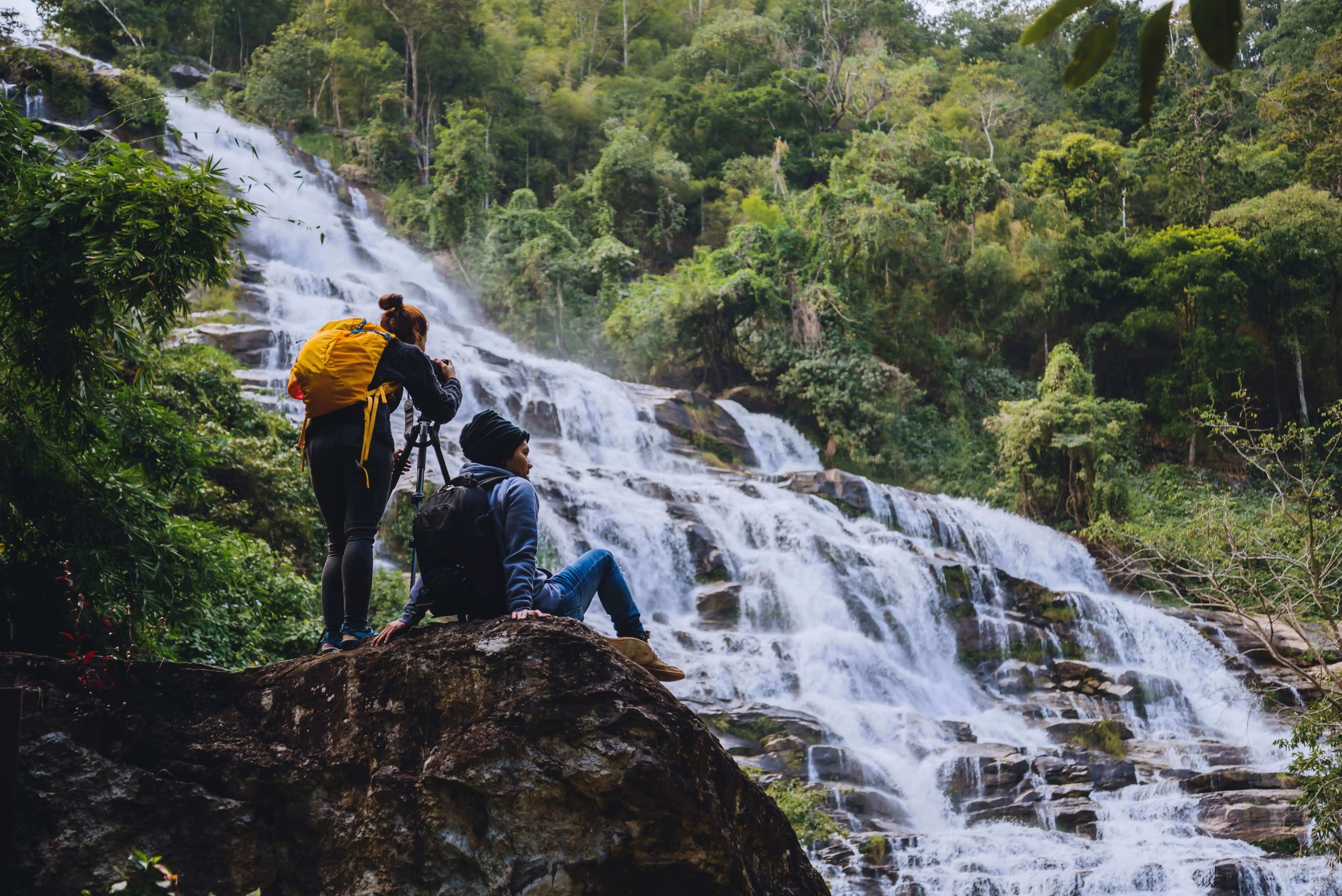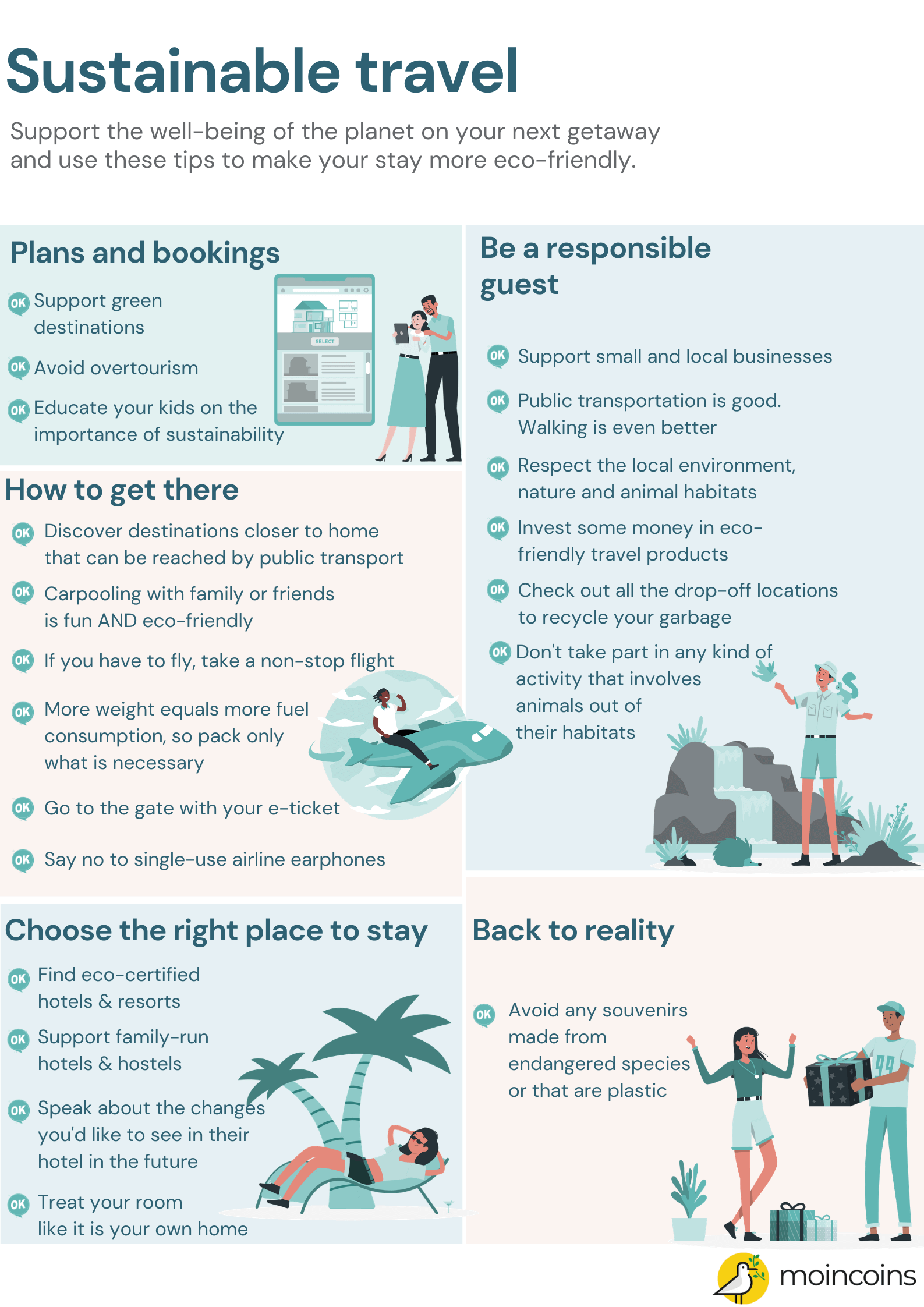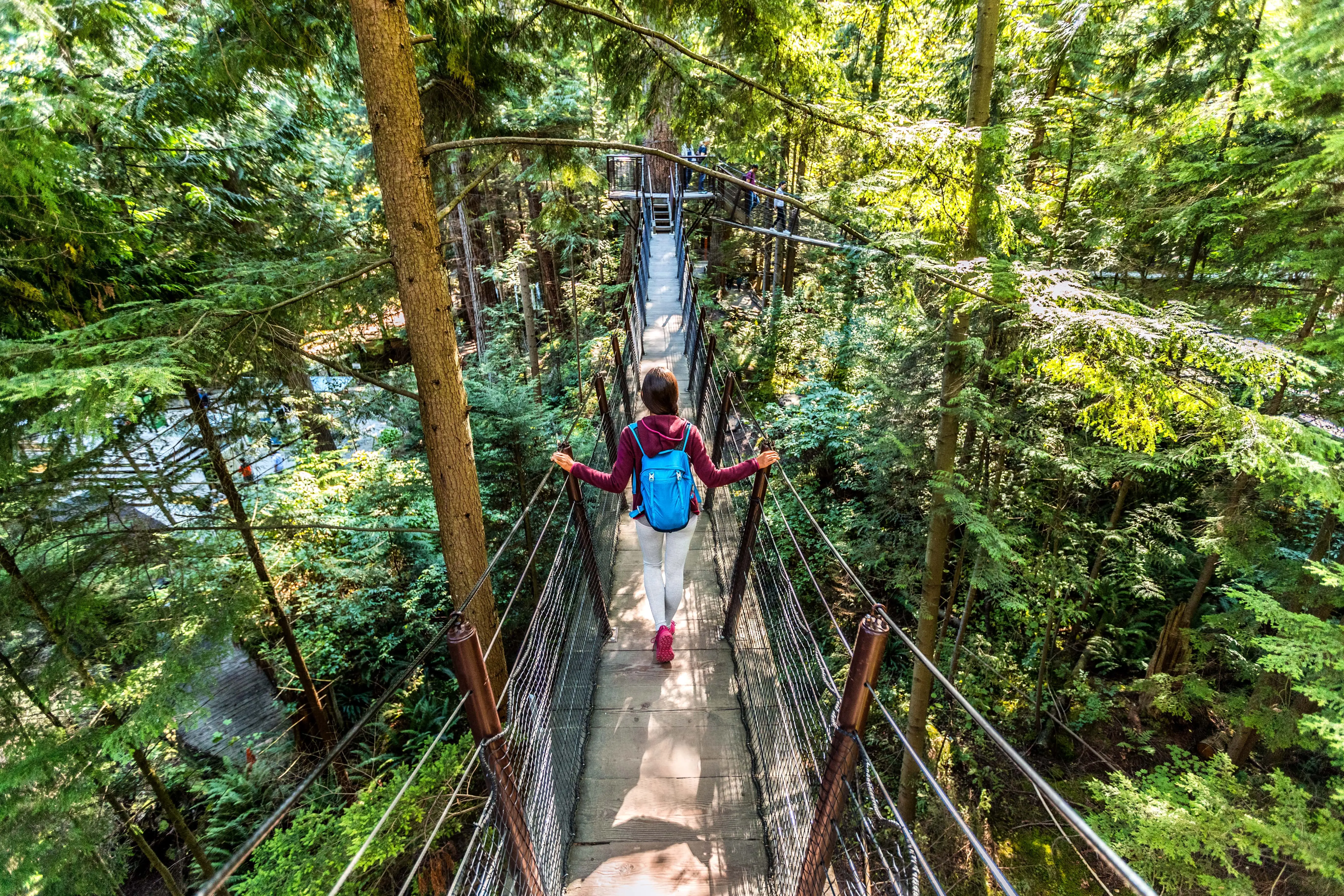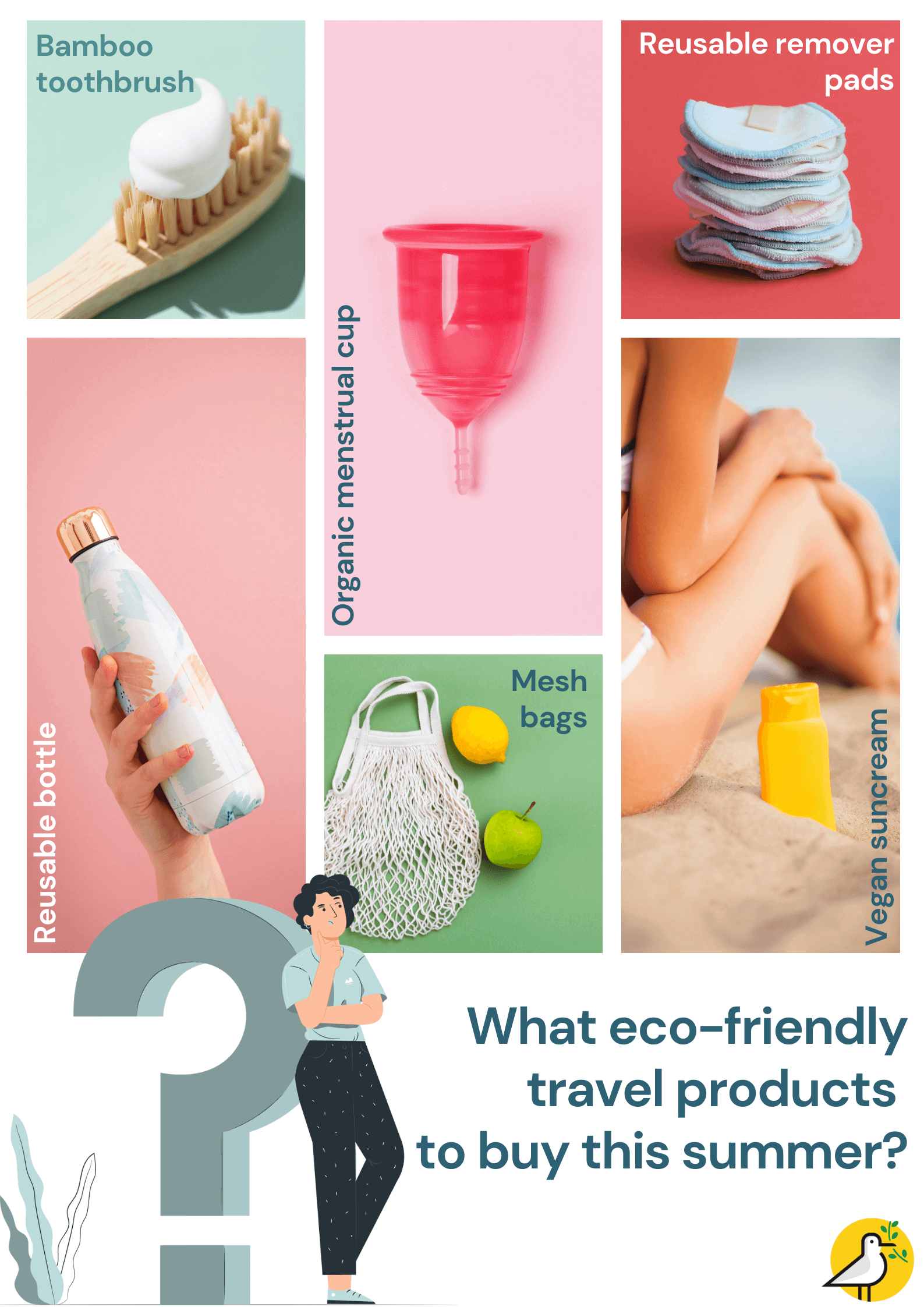Sustainable Travel: How to be more eco-friendly on your next getaway

What is eco tourism? How can we, as travellers, make our trips more responsible? Find the best tips and hints from the moment you plan your trip until the day you go back home.
International travelling is booming like never before. It’s this time of the year when everyone is planning trips, vacations and small getaways around the world. It is estimated that right before the COVID-19 pandemic there were 93.1 million visits overseas by UK residents, 3% more than in 2018. Obviously, all this human activity comes at an enormous environmental cost. We are here to ask the question: how can we support the well-being of the planet on our next getaway?
Let’s begin with the fact that the definition of sustainable travel is far from settled. But there are always small tips and hints you can follow to make your holidays more eco-friendly.
Where to start? And what to pack? Let’s begin!

Step 1: Planning and bookings
Support green destinations
Time for some research before we start. The first question is of course “Where to go this year?”. We know that your Instagram feed is full of top destinations that are being visited by thousands of tourists every year. But we are here to suggest something different. There are plenty of local and regional destinations around the world that are taking huge steps toward a more sustainable tourism industry. A list with the 2021 Top 100 Green Destinations will inspire you, will give you alternatives that you’ve never thought of and will make this year’s travelling an unforgettable experience.
There are also other platforms like Wild Frontiers, which was voted by the Guardian/Observer newspaper as the best ethical travel company, or the activist company Responsible Travel, that are also trying to create a more responsible travel industry for everyone. These platforms provide you with once-in-a-lifetime experiences that are ethical, sustainable and support local communities. Point for the green destinations this year!
Avoid overtourism
When too many people visit a place on holiday, the place gets spoiled and life is made difficult for the people who live there. Discover new destinations this year, where locals are not fed up with the crazy number of visitors but are pleased to interact with you. Enjoy the local life and tranquillity, take some peaceful time for yourself and your co-travellers and make your trip a real getaway from your daily routine and troubles.
Travelling with kids
Travelling with your little ones can be an amazing experience. Not only will it bond you even more, but it’s also a great chance to teach and encourage your kids to be conscious of their impact on the places they visit. In preparation for your trip, you could also attend family workshops and educational programs with guides, talks with naturalists and lecturers that will help your kids understand the extended meaning of going on a trip and respecting the environment with every single act they make. Building eco-awareness is important – especially since they'll have to live on this planet long after you're gone.
Step 2: Choose the best way to get there
Road trip time
Have you ever wondered how many incredible destinations there are located super close to your home? It’s time to explore them for the sake of nature. Travelling to destinations that can be reached by public transport cuts carbon dioxide (CO2) by half compared to a plane ride covering the same distance.
If you still have to use a car rather than a train, let it be fun and as eco-friendly as possible: carpooling with your family or friends is always a good choice for travelling together with your beloved people, doing karaoke in the car and reducing your carbon dioxide again.
Extra tip: if you’re planning to rent, check out an electric or hybrid car.
What if I need to use a flight?
You live in the UK and sometimes it’s not easy to avoid travelling by airplane. If you have to fly, try to make it an eco-conscious decision. First of all, choose a non-stop flight. Not only is it a time saver but it’s also more fuel-efficient. You can check that on your own by using MyClimate calculator. This tool is estimating the number of CO2 emissions that an airplane gives off per passenger for a given flight distance. So you can simply import the data of your upcoming flight and check its carbon footprint. You will see for example, if you fly from London (UK) to Santorini (GRE) with a direct flight, your CO2 emissions will be 0.464 tons but in case of a transit or a stopover in Milano (IT) the CO2 amount will be 0.517 tons.
If you also book your flight via Skyscanner you will be able to see more eco-friendly options with different airlines. This flight search engine analyses the aircraft model, checks for fuel-efficient engines, then calculates the emissions and finally labels the flights that emit less than the average amount of CO2.
Choose the budget airline companies. Economy fares are not only a good fit for saving you money but also for making your flight more eco-friendly. Usually, the A-class premium seats at the front of the plane offer more space and comfort, meaning they are responsible for a greater share of the plane’s weight. More weight means more fuel consumption and therefore more CO2 emissions.
But no matter where your seat is you always have to keep in mind that the more a plane weighs, the more carbon emissions it produces and that also affects our packing habits. Pack only what you need this year. Avoid all these items that you used to pack for vacation “just in case you might need them”. Every kilo counts when flying!
Before your flight, remember to have your ticket in a digital version. E-tickets can be scanned from your smartphone and there’s really no need to print them. Avoid energy costs, ink, and general environmental costs of printing.
Last but not least, say no to single-use airline earphones. We’re not sure if these pieces of plastic are recycled and there’s no need to take single-use items during the flight. Next time you can simply carry a small adapter with you and use your own earphones. The sound will also be much better.
Step 3: Choose the right place to stay
Find eco-resorts and family-run hotels
Nowadays, we all have thousands of choices to stay during our trips. To make your stay this year more eco-friendly, find eco-certified hotels and resorts. Green-certified accommodation means that the hotel is implementing green practices into hosting, including installing solar panels or other environmentally friendly energy sources, using an effective waste system, providing recycling or composting, using eco-friendly cleaning products, encouraging guests to use public transportation, etc.
Platforms like EcoHotels.com can make your trip as eco-friendly as possible and provide you with different hotel options, which are truly committed to sustainability and have trustworthy certifications to prove it. As a bonus, for every booking they plant a tree.
In case you’re not finding what you’re looking for, choose to stay in a family-run hotel or hostel. They always put a little of their own touch in their work, are more friendly and make it easier to create relationships with the locals. The fact that the hotel has probably been in the family for a long time, makes them passionate and excited to warmly welcome you and make your stay as unique as possible. Plus it’s always better to support small and local businesses.
But after all, even if you decide to stay in a big chain hotel group, you still have the opportunity to raise your voice and speak about sustainability: research their policies and be vocal about changes you'd like to see in their hotel in the future. By expressing your needs and communicating that this is a priority for you, you’re helping the tourist industry to change and include more environmentally friendly practices. Insist that other hotels and resorts are doing good things for the planet and that it’s important to alter their strategies in the favour of nature. You know, competition moves the whole world!
Treat your room like it is your own home
Save water. Living in a hotel room doesn’t change anything from the regular eco habits you follow when you’re at home. You simply have to act like you would at home.
Take shorter showers. Pay attention to the length of time spent in the shower, because it has a direct effect on water usage. It is estimated that a water-efficient showerhead uses approximately 9 liters per minute. That’s a lot so we recommend that you take a maximum of 5-minute showers and use the on-off switch while soaping and shampooing.
Also, avoid getting clean towels and bedding when not necessary. You can simply hang your towels on the rack, in order not to be washed multiple times during your stay. It is again estimated that 16% of a hotel’s water bill is coming from laundry washing.
Save energy. You can also hang the “Do not disturb” sign when leaving the room, to avoid vacuum cleaning every day that is consuming a lot of energy. And of course don’t forget to turn off the TV, screens, lights and air conditioning system when you leave the room.
Step 4: Be a responsible guest
Shop locally
Support small and local farmers’ markets for freshly-grown food. First of all, locally grown produce is full of flavour and nutritional value. Usually, crops are picked at their peak of ripeness and you don’t end up eating tasteless food that was harvested early and was shipped days ago to the retail store. In this way, you also help maintain farmland and green open spaces in the local communities you visit. Plus you can always talk with the local farmers —when you know where your food comes from and who grew it, you know a lot more about that food.
Buy locally made handicrafts and practical items that will forever connect you with the place and won’t end up dusty in a drawer —remember those souvenirs you never used? These items tell a story and represent the identity of the people who made them or the culture of the place you visited. In this way, you’re helping artisans scale their businesses, plus these kinds of products are always so much more authentic!
Skip fast-fashion stores and instead head to a vintage or a second-hand shop to explore diverse styles. If you buy regularly from such shops on every vacation you will develop a unique wardrobe and since most of these items are no longer made, you’ll be less likely to find yourself wearing the same top or jeans as a friend or colleague.
Public transportation is good. Walking is even better
When we visit a new destination we love exploring new places. It’s important though to find the most sustainable way to do it. We already explained the benefits of using public transportation, but it would also be a great idea to use a bike, an e-bike, or an electric scooter instead of renting a moped.
Even better? Walk, walk, walk! There’s no better way to discover new neighbourhoods, observe local people and habits, or accidentally find hidden streets and spots. Exploring the place on foot will also really help your cardiovascular health, especially if your regular daily life involves sitting behind a desk.
Respect the local environment

There’s a reason trails exist where they do. If you’re going hiking it’s important to stay on the given trails and other public footpaths. Those paths have been designed to preserve nature and animal habitats. When you are walking off trail you may stamp on plants and compact the soil, which makes it difficult for the plants and their roots to grow normally. You may additionally trample some plants that could potentially be the food sources of many insects or animals, which means that you are interfering in a part of animals’ life. Not to mention: never litter, never remove plants or feed animals.
Skip the motorised boat if you’re staying near water. Taking a boat might sound relaxing but you should be aware of what watercraft is doing to the ecosystem around you. Many chemicals used to clean and run a motorised boat often leak into the water, harming the environment and impacting or even killing wildlife. What’s more is that aquatic plants and animals have specific requirements for light, temperature, or pH level, factors which are again disrupted by the motors. So, all you have to do is opt for a kayak or canoe this year.
Invest some money in eco-friendly travel products
Invest some money to buy some eco-friendly travel products, before your vacation begins. Make simple purchase decisions and buy products that will help reduce your waste during your stay.

- Bring your own mug or buy a refillable water container and avoid coffee takeaway in plastic cups while strolling around.
- Buy mesh bags to shop for fruits, vegetables, and avoid plastic.
- Use biodegradable soaps, organic shampoos, and detergents.
- Try reusable makeup remover pads, which will not only help to reduce landfill waste caused by disposable cotton rounds and makeup wipes but will also save you money.
- Replace your toothbrush with a new one made of bamboo, a material that is strong, biodegradable and has no negative impact on the planet.
- Choose a menstrual cup instead of tampons or pads for your period days. It’s an affordable option, creates less waste and doesn’t need to be changed as often.
- Switching to an environmentally friendly, vegan sunscreen also helps protect the health of rivers, oceans and animals.
Recycling doesn’t have days off
Just because you’re away from home, school, or work doesn’t mean you should stop separating your plastics from your papers. If you’re doing a road trip you can bring a few small boxes to collect recyclables in your car and spot blue bins while driving.
Check out all the drop-off locations at your destination and try to get informed about the specific recycling rules your destination might have. Don’t forget to recycle magazines you read during your trip or any beverage containers (they might also be returned for refunds).
Animal tourism is not fun
According to World Animal Protection, more than half a million wild animals are being used by the tourism industry all over the world for economic benefits. Before thinking of going to the zoo or taking part in any kind of activity that involves animals out of their habitats or animals interacting with humans, keep in mind that this is unethical. Do we ever see the dark side of the attraction? So no animal riding this year, boycott any kind of zoos, avoid taking pictures with encaged species and oppose any activity in which you see animals out of their natural habitats.
Step 5: Back to reality
Time to give the souvenirs
And now it's time to go home. But many thousands of tourists come back with souvenirs made from animal sources – these kinds of souvenirs are often very openly sold in foreign touristic resorts, so it’s hard to imagine that you’re doing any harm. Therefore you always have to check from which materials your souvenir was produced: if it’s made of any parts of protected or endangered animals, including animal hides, tortoise-shell, ivory, or coral, it’s a clear NO to those.
If we want to keep enjoying this beautiful world we all should do something to show commitment and responsibility. The tourist industry is itself a devastating factor for our planet. So try to make your trip as wasteless, sustainable and responsible as possible.
Leave nothing but your footprints behind. And have a nice trip!